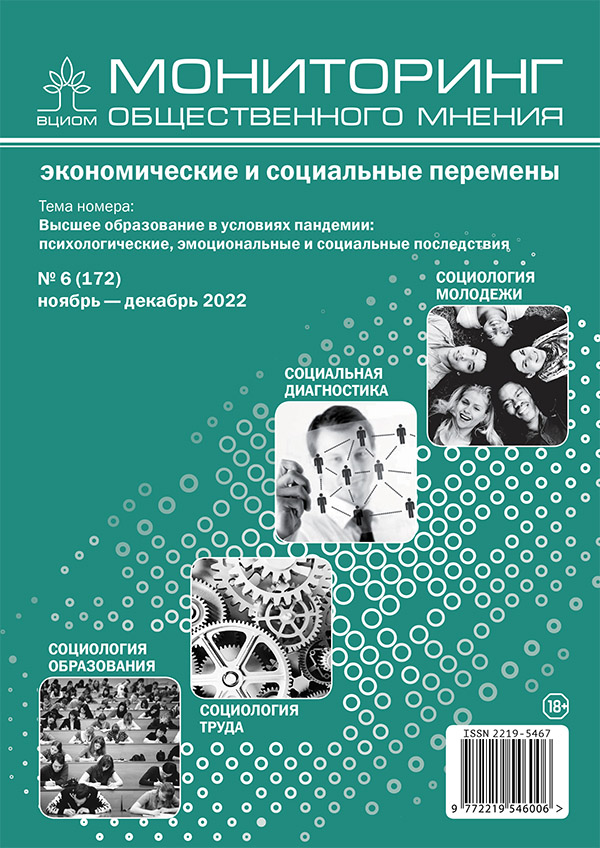Дисфункции цифровизации высшего образования (опыт пандемии COVID-19)
DOI:
https://doi.org/10.14515/monitoring.2022.6.2265Ключевые слова:
цифровизация образования, высшее образование, дисфункции, мотивация, коммуникация, цифровые технологииАннотация
В статье представлен анализ ключевых дисфункций цифровизации высшего образования, оценок и отношения студенческой молодежи к онлайн-обучению в условиях пандемии. Ключевым методом исследования выступает анкетный опрос студентов российских вузов. Эмпирические данные представлены результатами опроса, проведенного в июне — ноябре 2021 г. (N = 1 107). Дополнительно было проведено три фокус-группы с общим количеством участников 29 человек (апрель — май 2022 г.). Делается вывод, что оптимизм студентов в оценках преимуществ цифровизации образования связан с возможностью облегченного поиска учебных материалов, обмена опытом, сотрудничества в информационной среде. Результаты исследования иллюстрируют трансформацию роли преподавателя, который утрачивает функции наставника, передающего знания. В новых условиях у студентов появляется запрос на развлекательный характер обучения, использование цифровых технологий удержания интереса. В ходе исследования выявлены дисфункции цифровизации образования, касающиеся мотивации (неготовность студентов конспектировать и заучивать материал в условиях повсеместной доступности информации, перевод учебной деятельности в фоновый режим, «диванный» формат обучения), контроля и оценки знаний (приоритет тестовым алгоритмам, неэтичное поведение во время контрольных мероприятий и недобросовестные практики использования цифровых технологий), коммуникации (ухудшение навыков межличностного общения, ориентация на автоматизацию обратной связи, «безлюдные» технологии обучения). По результатам исследования сделан вывод о негативных последствиях цифровизации образования в условиях пандемии: снижение концентрации внимания, отвлечение от образовательных целей, поверхностное восприятие информации, недостаточность навыков ее критического анализа. Выявлена цепь дисфункции, включающая в себя снижение интереса к учебе, избирательный подход к обучению, сегрегацию знаний, деформацию системы контроля и оценки знаний.
Загрузки
Опубликован
Как цитировать
Выпуск
Раздел
Лицензия
Copyright (c) 2022 Мониторинг общественного мнения: экономические и социальные перемены

Это произведение доступно по лицензии Creative Commons «Attribution-NonCommercial-ShareAlike» («Атрибуция — Некоммерческое использование — На тех же условиях») 4.0 Всемирная.






